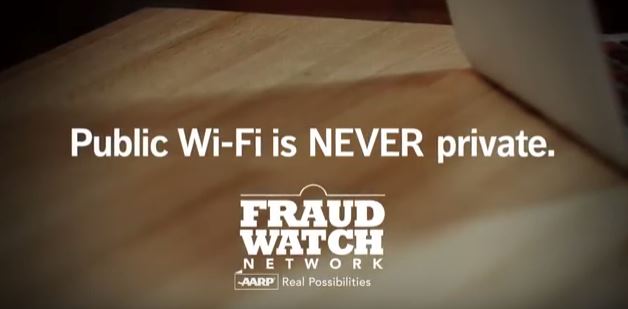AARP Hearing Center

WASHINGTON, D.C. – A new survey from AARP says busy consumers relying on the convenience of public wireless networks to keep up-to-date on email, social networks, shopping and even their finances often put their sensitive personal information at risk. The AARP Fraud Watch Network today launches a "Watch Your Wi-Fi" campaign to educate Americans about Wi-Fi hazards and how they can protect themselves. As part of the campaign, AARP has also begun encouraging businesses that maintain free wireless networks for their customers to participate in the educational effort.
Watch video here: https://www.youtube.com/watch?v=WQr2wpMT5bg
The results of the new AARP Fraud Watch Network survey show that nearly half of consumers log on to free public Wi-Fi at least once every few months. Of these, 33% have shopped online using their credit card, 37% have conducted online banking, and more than 70% have accessed their email, Facebook and other social media accounts.
“Whether it’s a business traveler making a last-minute rental car reservation, an over-scheduled mom who pauses at the coffee shop to make an online purchase for a child’s birthday gift, or a gig economy worker who goes online to see if his latest paycheck cleared his bank account, people too often put themselves at risk of identity theft by using unsecure public Wi-Fi,” said AARP Fraud Watch Network Ambassador Frank Abagnale.
“The convenience of free Wi-Fi networks remains a great asset for surfing the internet or checking the news or the latest weather forecast,” said Abagnale, one of the nation’s foremost experts on identity theft, forgery and secure documents. “But consumers should never use unsecured Wi-Fi to log-in to social media, engage in credit card transactions, or do online banking.”
For tips about how to safely use public wireless networks, consumers may visit a new Fraud Watch Network web page at: www.aarp.org/WatchYourWiFi. The site includes detailed descriptions of how fraudsters execute some common scams targeting wireless users, and a list of the “Four Things Never to Do on Public Wi-Fi.”
The FWN campaign is also assisting coffee shops, retail stores and other businesses that provide free Wi-Fi as a customer convenience and would like to remind their customers how to avoid cyber scams: a small poster-type tip sheet may be downloaded from the Watch Your Wi-Fi website, and posted in shops and other public locations.
A large majority of the respondents to the FWN survey (70%) reported that they do not recall seeing any posted warnings at public Wi-Fi locations about using the unsecured network to shop, bank, or access social media sites.
Two-thirds of the Wi-Fi users said they would be more favorable toward a coffee shop, bookstore, hotel, or other business if they provided users with information about using their wireless network safely.
Abagnale, who was named AARP Fraud Watch Ambassador in 2015, has been associated with the FBI for more than four decades, and has advised and consulted with hundreds of financial institutions, corporations and government agencies around the world. Abagnale’s story was told in his best-selling book, Catch Me if You Can, and in the 2002 movie of the same name, starring Leonardo DiCaprio and Tom Hanks.































































